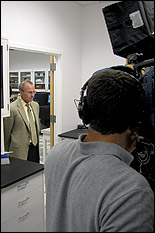
|
 |
Professor Gregory Payne being interviewed. |
|
Professors from and affiliated with the Fischell Department of Bioengineering were recently interviewed for an upcoming episode of PBS' Nightly Business Report.
Correspondent Dana Greenspon visited the Kim Building's Functional Macromolecular Laboratory and other campus destinations to learn about how nanotechnology could impact food science, technology, and packaging. Among the faculty interviewed were Professor Gregory Payne, Director of UMBI's Center for Biosystems Research and Graduate Program in Bioengineering affiliate faculty member; and The Fischell Department of Bioengineering's Professor Peter Kofinas, Director of the Graduate Program in Bioengineering. Professor and Chair of the Department of Food Science and Nutrition Mickey Parish was also interviewed.
After Parish provided Greenspon with an overview of nanotechnology's potential impact on food safety, Pane and Kofinas offered additional perspective with specific examples for their own research and collaborations with major government agencies such as the Food and Drug Administration (FDA) and United States Department of Agriculture (USDA).
One of Payne's goals is to provide supermarkets and wholesalers with handheld devices capable of detecting pathogens, allergens or toxins in food. "A grocer needs to make a decision on whether to accept a load of produce," he explains. "He can't wait while he sends a sample to a lab, and the test can't be expensive. He needs the lab in his hand." Payne and his team are designing biosensors that use DNA, proteins, and antibodies to detect problems by reacting to specific contaminants in food. The challenge lies in integrating these organic sensors with microelectronic devices capable of communicating with them, then recording and analyzing the data provided. For that aspect of his work, he collaborates with other University of Maryland researchers at the Maryland NanoCenter.
Kofinas is taking a different approach to a very similar problem: He uses molecularly imprinted polymers (MIPs)?tiny, gel-like molds into which only a specific target molecule will fit?to capture viruses or other substances. Food packaging, Kofinas explains, could be coated in a thin layer of polymer containing nanoscale cavities designed to recognize a specific food-borne pathogen such as E. coli. The packaging could be further designed to respond to the sensing of the target with a chemical reaction to change its color as a warning to stores and consumers.
Greenspon's segment is expected to air Friday, July 27. Viewers should check their local PBS station listings for exact dates and times.
For More Information:
Visit Professor Kofinas? Functional Macromolecular Laboratory web site »
Visit UMBI's Center for Biosystems Research web site »
Related Story:
Clark School "Virus Sponge" Could Improve Flu Treatments, Diabetes Care, Vaccine Development »
July 26, 2007
|